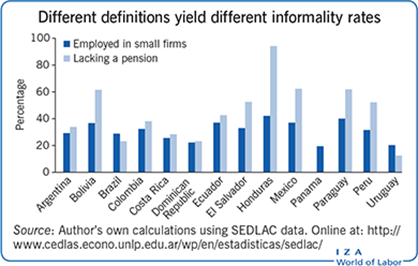Elevator pitch
There are more informal workers than formal workers across the globe, and yet there remains confusion as to what makes workers or firms informal and how to measure the extent of it. Informal work and informal economic activities imply large efficiency and welfare losses, in terms of low productivity, low earnings, sub-standard working conditions, and lack of social insurance coverage. Rather than quibbling over definitions and measures of informality, it is crucial for policymakers to address these correlates of informality in order to mitigate the negative efficiency and welfare effects.

Key findings
Pros
The term “informal” raises awareness that many workers and firms are engaged in unproductive activities in low-quality working conditions.
Defining informality allows identification of those who are informal and therefore potentially vulnerable.
A flexible definition can exploit available data to measure the extent of informality.
The correlates of informality are widely known and can be addressed directly without necessarily formalizing workers or firms.
Cons
The term “informal” is too broad for targeting specific dimensions of informality, such as low productivity, low earnings, and job insecurity.
Different definitions can misrepresent the magnitude or severity of informality, and can muddy effective policy targeting.
Defining informality according to available data risks missing important aspects of being informal or different degrees of informality.